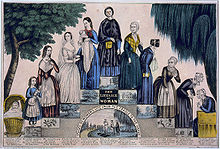தனிப்பட்ட வாழ்க்கை

தனிப்பட்ட வாழ்க்கை (personal life) என்பது ஒரு தனிநபரின் வாழ்க்கையின் போக்கு ஆகும். குறிப்பாக ஒரு தனிநபரின் அடையாளத்திற்குப் பங்களிக்கும் தனிப்பட்ட விருப்பங்களின் தொகுப்பு ஆகும்.[1]
பண்டைய காலத்தில், வேட்டை-திரட்டல் வாழ்க்கை முறைமைக்கு அப்பால் அமைந்த முன்னைப் புத்தியல் காலங்களில் பெரும்பாலான மக்களின் நேரம் உணவும் தங்குமிடம் போன்ற தேவைகளை நிறைவு செய்ய வேண்டி, வாழ்தகு வேளாண்மை வாழ்க்கையிலேயே கழிந்தது. ஓய்வு நேரம் மிக அருகியே கிடைத்தது. மேலும் அதிக பொழுதுபோக்கும் இல்லை. [2] மக்கள் சமூகத்தில் தங்கள் சமூகத்தில் அவர்கள் வகித்த பாத்திரத்தை வைத்து அடையாளம் காணப்பட்டனர். தனிப்பட்ட விருப்பத்தின்படி இல்லாமல் தேவையின் அடிப்படையில் வேலைகளில் ஈடுபட்டனர். அத்தகைய சமூகங்களில் தனிப்பட்ட வாழ்க்கை அரிதாகவே இருந்தது.
தனிப்பட்ட வாழ்க்கை எனும் புதிய கண்ணோட்டம் புத்தியற் கால மேற்கத்திய வாழ்க்கையின் நீட்சியே ஆகும். தற்கால மக்கள் தம் அன்றாடப் பணிகளில் இருந்து தனியரின் தனிப்பட்ட வாழ்க்கையைத் தனிப்படுத்தி பணிக்கும் வாழ்க்கைக்குமான சமனிலையைப் பேண விழைகின்றனர்.[3]
வேலைக்கு வெளியே தனியொருவரின் தேர்வுகளும் முன்னுரிமைகளும் அவரின் தனிப்பட்ட வாழ்க்கையை வரையறுக்கின்றன. இதில் விளையாட்டு தேர்வு, ப்ண்பாட்டு ஆர்வங்கள், உடைப்பாணி, நண்பர்கள் தேர்வு, வாழ்க்கைத் துணை தேர்வு போன்ன்றனவும் உள்ளடங்கும். குறிப்பாக, தன் ஓய்வு நேரத்தில் மேற்கொள்ளும் செயல்பாடுகள் ஒருவரின் தனிப்பட்ட வாழ்க்கையை வரையறுக்கின்றன.[சான்று தேவை] காட்டாக, ஓர் அமெரிக்கனுக்கு அன்றாடம் ஐந்து மணி நேர ஓய்வு கிடைக்கிறது. இதில் அவர் பாதி நேரத்தைத் தொலைக்காட்சி பார்க்க செலவிடுகிறார்.[4] சமயவாதிகள், அறவியலாளர்கள், ஆளுமை வளர்ச்சி குருக்கள், தனியர் வாழ்க்கையைக் கட்டுபடுத்தவும் கையாளவும் கற்றுத் தர முற்றுகையிடுகின்றனர்.[5][6][7]
அமெரிக்கா, கனடா போன்ற நாடுகளில் தகவல் தனிமையிலும் முடிவெடுக்கும் தனித்தன்மையிலும் தனிமையைப் பெரிதும் போற்றி மதிக்கின்றனர்; அவர்கள் ஒருவரின் தனிப்பட்ட வாழ்க்கை சார்ந்த மிக அணுக்கமான விவரங்களைப் பொறுத்தவரையில் மற்றவர்களின் கட்டுபாடு ஏதும் இல்லாமல் விடுதலையாகத் தனித்திருக்க விடப்படும் உரிமையை எதிர்பார்க்கின்றனர் .[8]
வரலாறு
[தொகு]
ஆங்கிலேய மெய்யியலாளர் ஜான் இலாக்கே (1632-1704) தனியர் உரிமைகள் குறித்து முதன்முதலில் பேசியவர் ஆவார். இவர் 17 ஆம் நூற்றாண்டில் தனியரின் இயல்பான உரிமைகளின் இலக்குகளாக வாழ்தலுக்கான உரிமை, விதலையாக இயங்குவதற்கான உரிமை, சொத்துரிமை, இன்பந் தேடல் உரிமை போன்றவற்றை முன்வைத்தார்.[சான்று தேவை]
சமூகவியல்
[தொகு]
தனிப்பட்ட வாழ்க்கை என்பது மேற்கத்திய சமூகம் உருவாக்கிய கருத்தியலே. அமெரிக்க மக்கள் தனிமையைப் பெரிதும் மதிக்கின்றனர். ஐக்கிய அமெரிக்கக் குடியேற்றக் காலமுதலே, அமெரிக்காவின் தனிமாந்த வாதத்தையும் தனித்தியங்கும் கோட்பாட்டு வரையறையையும் வரலாற்றாளர்கள் சுட்டிக் காட்டியுள்ளனர்.[9][10]
ஓய்வுச் செயல்பாடுகள்
[தொகு]
தனியர் ஒருவர் தன் ஓய்வு நேரத்தில் ஈடுபடும் செயல்பாடுகளே அவரது தனிப்பாட்ட வாழ்க்கையில் பெரும்பங்கு வகிக்கிறது. பொதுவாக, ஓய்வு நேரச் செயல்பாடுகளை வினையாற்றாத அமைதியானதாகவும் உடல், மன உழைப்பைக் கோரும் செயல்முனைப்புடையதாகவும் வகைபடுத்தலாம்.[11]
தொலைக்காட்சி பார்த்தலும் இசை கேட்டலும் விளையாட்டு அரங்கு நிகழ்ச்சிகளைப் பார்த்தலும் திரைப்பட அரங்கு சென்று படம்பார்த்தலும் வினைகோராத அமைதியான தனிப்பட்ட வாழ்க்கையாகும். இவற்றில் தனியர் முயற்சி ஏதுமின்றிப் பொழுது போக்குகிறார்.[சான்று தேவை]
நடத்தல், ஓடல், மிதிவண்டி ஓட்டுதல், பூப்பந்து, காற்பந்து, சதுரங்கம், எழுதுதல் ஆகிய உடல், மன ஆற்றல்களைச் செலவிடும் செயல்பாடுகள் முனைப்பானவை ஆகும்.[சான்று தேவை]
ஐக்கிய அமெரிக்க 2007 ஆம் ஆண்டு ஓய்வு நேரப் பயன்பாட்டுப் புள்ளிவிவரப்படி, சராசரியாக 15 அகவையினர் தம் ஓய்வு நேரத்தில் 4.9 மணிநேரத்தைப் பயன்படுத்துகின்றனர். இதில்யாட்டிலும் உஅடற்பயிற்சியிலும்2.6 மணி நேரம் தொலைக்காட்சி பார்க்கின்றனர். 19 மணித்துளிகள் விளையாட்டிலும் உடற்பயிற்சியிலும் முனைப்பாகப் பங்கேற்கின்றனர்.[4]
தனிமை
[தொகு]
தனிமை என்பது இருவேறு கருத்துப்படிமங்களை உள்ளடக்கியதாகப் புரிந்துகொள்ளப் படுகிறது, இவற்றில் ஒன்று தகவல்சார் தனிமை; மற்றொன்று முடிவெடுக்கும் தனித்தன்மை. முன்னது ஒருவரின் தனிப்பட்ட வாழ்க்கை சார்ந்தமிக அணுக்கமான விவரங்களைப் பொறுத்தவரையில் தனித்திருக்க விடப்படும் உரிமையாகும்; பின்னது தேவையற்ற ஒழுங்குமுறையில் இருந்தும் கட்டுபாட்டில் இருந்தும் விடுதலையாக இயங்குதல் ஆகும்.[8]
மேற்கோள்கள்
[தொகு]- ↑
Baker, Maureen (2010). Choices and Constraints in Family Life (2 ed.). Don Mills, Ontario: Oxford University Press. p. 1. பன்னாட்டுத் தரப்புத்தக எண் 978-0-19-543159-9.
இந்நூலில் மிக அணுக்கமான உறவுகள் நம் சொந்த முன்னுரிமைகளால் தாக்கமுற்றாலும் பேரளவில் நம் தேர்வுகள் குடும்பச் சூழல்களாலும் அகல்விரிவான சமூக நிகழ்ச்சிகளாலும் வடிவம் பெறுகின்றன நான் வாதிடுகிறேன் [...].
- ↑
Scott, Simeon (2011). "Contradictions of capitalism in health and fitness leisure". In Cameron, Samuel (ed.). Handbook on the Economics of Leisure. Elgar Original Reference Series. Cheltenham, UK: Edward Elgar Publishing. p. 155. பன்னாட்டுத் தரப்புத்தக எண் 9780857930569. பார்க்கப்பட்ட நாள் 3 November 2019.
[...] we turn to the writings of anthropologists and archaeologists, the majority of whom believe that our earliest ancestors were well fed and healthy. They obtained their subsistence by hunting and gathering, they had a relatively egalitarian ethic and more leisure time available to them than people in any subsequent mode of production.
- ↑
Kelly, Matthew (2011). Off Balance: Getting Beyond the Work-Life Balance Myth to Personal and Professional Satisfaction. New York: Penguin. p. 60. பன்னாட்டுத் தரப்புத்தக எண் 9781101544280. பார்க்கப்பட்ட நாள் 3 November 2019.
For hundreds of years, almost from the beginning of corporate history, a divide between the personal life and professional life has been asserted. This is a false divide. [...] It is impossible to separate the personal from the professional: the two are intricately linked.
- ↑ 4.0 4.1 Leisure Time on an Average Day. Bureau of Labor Statistics. பார்க்கப்பட்ட நாள் 26 February 2011.
{{cite book}}:|work=ignored (help) - ↑ Clarke, Charles (2013). Woodhead, Linda; Winter, Norman (eds.). Religion and Personal Life: Debating Ethics and Faith with Leading Thinkers and Public Figures Including: Alastair Campbell, Steve Chalke, Delia Smith, Polly Toynbee, Giles Fraser, John Harris, Mary Ann Sieghart. Westminster faith debates. Darton, Longman and Todd. பன்னாட்டுத் தரப்புத்தக எண் 9780232530186. பார்க்கப்பட்ட நாள் 3 November 2019.
- ↑
Sorley, W. R. (2012) [1911]. The Moral Life: And Moral Worth. Cambridge manuals of science and literature (3, revised ed.). Cambridge: Cambridge University Press. p. 26. பன்னாட்டுத் தரப்புத்தக எண் 9781107605879. பார்க்கப்பட்ட நாள் 3 November 2019.
The virtues of personal life are to be regarded both from the side of control and from the side of culture. On the one hand the varied impulses and desires have to be regulated so as not to interfere with the realisation of the moral ideal.
- ↑
Davis, Roy Eugene (1997) [1995]. Life Surrendered in God: The Philosophy and Practices of Kriya Yoga. Yoga Series. Delhi: Motilal Banarsidass Publishers. p. 176. பன்னாட்டுத் தரப்புத்தக எண் 9788120814967. பார்க்கப்பட்ட நாள் 3 November 2019.
[...] the guru may say, 'Go home and get your personal life straightened out. [...]'
- ↑ 8.0 8.1 Kumar, Krishna; et al. (997). Public and private in thought and practice : perspectives on a grand dichotomy. Chicago; London: The University of Chicago Press. p. 383. பன்னாட்டுத் தரப்புத்தக எண் 978-0-226-88624-4.
- ↑ de Tocqueville, Alexis (1840). Democracy in America. London: Saunders and Otley.
- ↑
Compare: Schleifer, James T. (2012). "5: How Does Democracy Threaten Liberty?". The Chicago Companion to Tocqueville's Democracy in America. Chicago: University of Chicago Press. p. 82. பன்னாட்டுத் தரப்புத்தக எண் 9780226737058. பார்க்கப்பட்ட நாள் 2016-08-08.
For Tocqueville individualism meant the habit of living isolated from your fellows, of not concerning yourself with any public affairs, and of abandoning those matters to the care of the government as the only clearly visible representative of common interests. Like democratic materialism, democratic individualism led to the death of civic life and opened the door to any despotic power that would assume responsibility for shared interests. [...] We need to recognize that Toqueville [..] treated the United States as something of an exception. He had described the American republic as shielded from the worst effects of democratic materialism; in his analysis, it was also insulated from individualism.
- ↑ Stebbins, Robert A. (November 2002). "Choice and Experiential Definitions of Leisure". LSA Newsletter 63. http://people.ucalgary.ca/~stebbins/reflections1.pdf.
மேலும் படிக்க
[தொகு]- Blyton, Paul & Blundsdon, Betsy & Reed, Ken (2009). Ways of Living: Work, Community and Lifestyle Choice. பன்னாட்டுத் தரப்புத்தக எண் 978-0-230-20228-3.
- Freud, Sigmund (1901). The Psychopathology of Everyday Life.
- Highmore, Ben (Editor) (2001). The Everyday Life Reader. பன்னாட்டுத் தரப்புத்தக எண் 978-0-415-23025-4.
{{cite book}}:|author=has generic name (help) - Lefebvre, Henri (1947). Critique of Everyday Life.
- Shilling, Chris & Mellor, Philip A. (2001). The Sociological Ambition. பன்னாட்டுத் தரப்புத்தக எண் 978-0-7619-6548-0.
- Rowntree, Seebohm (1952). English Life and Leisure. A social study.
- Vaneigem, Raoul (1967). The Revolution of Everyday Life.
